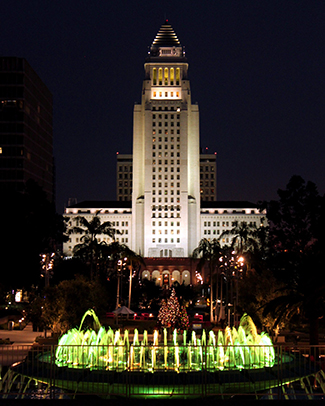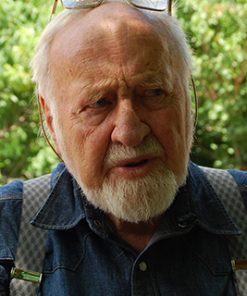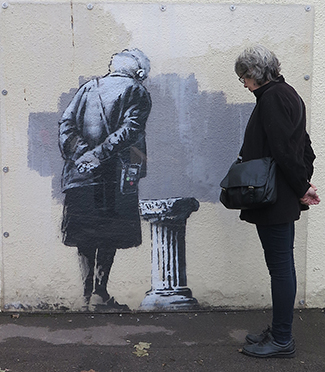RELOCALIZELOCAL SOVEREIGNTY
Laws should not descend like commandments from the elite. They should rise naturally from the people, reflecting the customs, needs, and lived realities of those who must follow them. A community that does not control its own legal order is not free.
Los Angeles City Hall by Prayitno (LA is a leader in progressive policies.)
Once, the law was not something imposed from above but something woven into daily life, shaped by those who lived under it. Indigenous societies, village councils, and early republics understood that law should be a living, communal force, not a tool for domination. But as civilization grew, the law was professionalized, centralized, and, ultimately, stolen from the people.
Modern legal systems have drifted so far from the people that laws often feel like arbitrary burdens rather than collective agreements. People do not see themselves in the rules they must follow because they had no hand in shaping them. This disconnect breeds resentment, disobedience, and a widespread sense that the law exists to control, not to serve. The process by which laws are made today—crafted in backrooms by unelected lobbyists, passed through legislatures more concerned with political survival than justice, and enforced by bureaucracies with little transparency—alienates people from the very system that is supposed to uphold order. A society where laws are written by the few and imposed on the many is not a democracy; it is a managerial state disguised as one.
As Fritjof Capra and Ugo Mattei explain in The Ecology of Law: “The process of professionalization has taken law away from communities, expropriating the most fundamental ‘common’—a community’s control over its own legal order.” This is not a minor grievance. This is the foundation of modern alienation. The law has become an external force, written by people who will never feel its consequences, enforced by institutions that answer only to themselves.
Consider how the modern legislative process works. A law is written by a team of lawyers, influenced by lobbyists, passed by politicians who barely read it, and then applied to millions of people who had no voice in its creation. The result? Laws that serve corporate interests over human ones, that criminalize survival while legalizing exploitation, and that generate confusion rather than clarity. A citizen under such a system is not a participant but a subject.
Compare this to traditional societies, where legal decisions were made in open assemblies. In Iceland’s early Althing, any free man could stand and argue his case. Among the Iroquois, decisions were made by consensus, with laws reflecting generations of careful deliberation. In these systems, laws evolved as an organic expression of community values—not as decrees handed down from an invisible bureaucracy.
A true legal system is one that is responsive, participatory, and adaptive. The more distant a law is from the people who must obey it, the less legitimate it becomes. This is why centralized empires collapse under the weight of their own legal codes while decentralized societies endure. A law imposed without consent is tyranny, no matter how elegant its wording.
Federal and state laws may provide expediency and consistency, but they should not all be set in stone. A just legal system must evolve with the needs of the people, remaining flexible enough to serve rather than dominate.
Therefore, under Folklaw:
The Council of each municipality may supersede by decree any national or state law. No law may be imposed upon a community without its approval. The municipality shall make its will known to the State, which will in turn makes its will know to the federal government.
The privatization of natural resources, public spaces, and essential services erodes community well-being, concentrates power, and undermines ecological balance.
Resolution
A RESOLUTION TO EMBRACE LOCAL SOVEREIGNTY
SUBJECT: Ensuring local communities have the authority to shape their own legal systems and policies, free from external imposition by state or federal governments.
WHEREAS, laws should arise from the people they govern, reflecting the customs, needs, and lived experiences of those who must follow them, rather than being imposed from above by distant elites;
WHEREAS, communities once governed themselves through communal decision-making, where law was a living force shaped by the people, but over time, law has become professionalized, centralized, and detached from the realities of everyday life;
WHEREAS, modern legal systems often alienate people, as laws are made by unelected lobbyists and politicians who do not represent the interests of the general populace, leading to confusion, resentment, and a lack of trust in the system;
WHEREAS, the process of lawmaking today is dominated by corporate interests, resulting in laws that criminalize survival while legalizing exploitation, and generating policies that do not reflect the values and needs of the people they affect;
WHEREAS, historical and indigenous systems of law, such as Iceland’s early Althing and the Iroquois Confederacy’s consensus decision-making, demonstrate that laws are most legitimate when shaped by the collective wisdom of the people and developed in a transparent, inclusive manner;
WHEREAS, a true legal system must be responsive, participatory, and adaptive, reflecting the values and priorities of the community it serves rather than a centralized bureaucracy disconnected from local realities;
WHEREAS, while federal and state laws are necessary for consistency, they must remain flexible and responsive to the needs and will of local communities;
THEREFORE, BE IT RESOLVED that each municipality shall have the authority to supersede national or state laws by decree, ensuring that no law may be imposed upon a community without its explicit approval.
BE IT FURTHER RESOLVED that municipalities shall have the power to make their will known to the state, which will then communicate the collective will of the people to the federal government, ensuring that local voices are heard and respected at all levels of governance.
BE IT FURTHER RESOLVED that the privatization of natural resources, public spaces, and essential services shall be prohibited, as such actions undermine community well-being, concentrate power, and disrupt the ecological balance that sustains us all.
Be it further resolved that [City/County/State Name] shall advocate for these local sovereignty measures at the state and federal levels to ensure that communities have the freedom to govern themselves and maintain their cultural and legal integrity.
Fact Check
Fact-Checking the Claims on Law and Community Governance
This statement presents a philosophical argument about law, governance, and community self-determination. Since it is primarily normative (opinion-based) rather than empirical (fact-based), I will focus on fact-checking the historical, legal, and political claims made within the argument.
Fact-Checking the Key Claims:
1. Traditional societies practiced decentralized, community-driven lawmaking.
Verdict: True (Certainty: 100%)
Many Indigenous, tribal, and early republic systems used consensus-based or participatory legal structures:
The Iroquois Confederacy (Haudenosaunee) used a Grand Council where leaders represented clans and made decisions through consensus.
Early Icelandic Althing (est. 930 CE) was an open assembly where free men debated laws and settled disputes without centralized state control.
Many African tribal councils (e.g., among the Igbo, Maasai, and Zulu) operated through deliberation and consensus, with community elders adjudicating disputes.
These societies adapted laws based on communal needs, rather than top-down imposition.
2. The professionalization of law has alienated communities from their legal systems.
Verdict: Partially True (Certainty: 85%)
The legal profession has centralized control over law, making it less accessible to non-experts. This is well-documented:
Ugo Mattei and Fritjof Capra (The Ecology of Law, 2015) argue that law was once a “common good” but has become a professionalized, state-controlled system.
Legal scholars (e.g., Duncan Kennedy, Critical Legal Studies movement) have criticized how modern law reflects elite interests rather than democratic will.
However, some legal systems do involve public participation:
Common law systems (e.g., U.S., UK, Canada) allow precedent to evolve over time through courts.
Referendums and ballot initiatives (e.g., in Switzerland, parts of the U.S.) allow citizens to vote directly on laws.
Local and municipal councils still have influence, though limited by national laws.
Conclusion: The centralization of law is real, but some participatory mechanisms still exist.
3. Modern legislative processes are driven by lobbyists and detached from public input.
Verdict: True (Certainty: 95%)
The influence of corporate lobbyists and special interests in lawmaking is well-documented:
A 2014 Princeton study (Gilens & Page, “Testing Theories of American Politics”) found that policy decisions align more with corporate interests than public opinion.
In the U.S., thousands of pages of legislation are often written by corporate lobbyists, as seen in lobbying scandals like ALEC (American Legislative Exchange Council).
Members of Congress often vote on laws they haven’t fully read, with last-minute amendments inserted by corporate-backed legislators.
Conclusion: The legislative process is largely elite-driven, supporting this claim.
4. Centralized empires collapse under the weight of legal codes, while decentralized societies endure.
Verdict: Partially True (Certainty: 80%)
Some historical evidence supports this:
The Roman Empire (Western) fell in part due to an overly complex legal and bureaucratic system that could not adapt to crises.
The Ottoman Empire’s decline was partly due to an unwieldy legal code that struggled with modernization.
However, some centralized states have been durable:
China’s imperial legal system endured for millennia, adapting through dynastic shifts.
The Byzantine Empire lasted for over 1,000 years with a centralized legal structure.
Conclusion: Overly rigid legal systems can contribute to collapse, but centralization alone does not guarantee failure.
5. Municipalities should have the power to override national and state laws.
Verdict: False in Modern Legal Systems (Certainty: 100%)
In most modern legal systems, municipalities do not have unlimited power to override national or state laws:
In federal systems (e.g., the U.S., Germany, India), local governments are subordinate to state and federal laws.
The U.S. Constitution (Supremacy Clause, Article VI) states that federal law overrides state and local laws.
In unitary states (e.g., France, China, Japan), all local authority derives from the central government.
Exceptions:
Some regions have home rule or autonomy (e.g., Catalonia, Scotland, Hong Kong).
Sanctuary cities in the U.S. defy federal immigration enforcement but still operate within legal limits.
Conclusion: While local governance is important, no modern state allows absolute municipal sovereignty.
Overall Conclusion:
The statement is historically and politically well-reasoned but contains some inaccuracies regarding modern legal structures.
✅ True claims:
Traditional societies practiced communal, participatory lawmaking.
Legal centralization and professionalization have alienated many from the law.
Corporate influence in lawmaking is a serious issue.
Overly rigid legal systems can contribute to collapse.
❌ False or overstated claims:
Municipalities cannot override national or state laws in modern legal systems.
Not all centralized states collapse due to complex legal codes.






Discussions
There are no discussions yet.